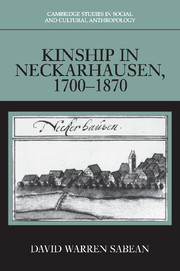Book contents
- Frontmatter
- Contents
- List of tables
- Abbreviations
- Abbreviations of sources
- On reading kinship diagrams
- Glossary
- Preface
- Introduction
- 1 An introduction to kinship
- 2 Vetterleswirtschaft: Rise and fall of a political discourse
- 3 The politics of incest and the ecology of alliance formation
- Cohort I (1700–1709)
- Cohort II (1740–1749)
- Cohort III (1780–1789)
- Cohort IV (1820–1829)
- Cohort V (1860–1869)
- Conclusion
- Appendix
- Bibliography
- General index
- Index of villagers
3 - The politics of incest and the ecology of alliance formation
Published online by Cambridge University Press: 04 August 2010
- Frontmatter
- Contents
- List of tables
- Abbreviations
- Abbreviations of sources
- On reading kinship diagrams
- Glossary
- Preface
- Introduction
- 1 An introduction to kinship
- 2 Vetterleswirtschaft: Rise and fall of a political discourse
- 3 The politics of incest and the ecology of alliance formation
- Cohort I (1700–1709)
- Cohort II (1740–1749)
- Cohort III (1780–1789)
- Cohort IV (1820–1829)
- Cohort V (1860–1869)
- Conclusion
- Appendix
- Bibliography
- General index
- Index of villagers
Summary
The early modern state was greatly concerned with the kinds of alliances that its subjects could enter into. During the second half of the sixteenth century, when princes consolidated their power through the detailed elaboration of codes of law, every Protestant territory in Germany issued a precise and long list of prohibited marriage partners and decreed that the table of prohibited degrees should be read periodically in each parish church. In many of the ecclesiastical ordinances (Kirchenordnungen), more space was given to the issue of marriage interdictions than any other matter. Catholic territories remained under the rules established in canon law, but theologians and lawyers in that tradition were as busy as their Protestant counterparts elaborating the specifics and providing a theoretical justification for each detail.
The state, of course, was not a unified entity, even though the system of rules it provided established a uniform code for its inhabitants. Different discursive groups fed off separate traditions and texts, promoted alternative rules, and developed specialized vocabularies and systems of logical inference. The most elaborate schemas were worked out by theologians and jurists in competition with each other and with cross-references and rhetorical borrowings. But rulers frequently developed their own perspectives quite outside the exigencies of learned discourse. In this matter, as in most others, little work has been done on the degree to which the state responded to attitudes and values articulated within the cultures of different strata of the population, and it is quite possible that the conservatism evidenced in the law codes reflected a popular malaise prompted by initial Reformation tampering with incest prohibitions.
- Type
- Chapter
- Information
- Kinship in Neckarhausen, 1700–1870 , pp. 63 - 90Publisher: Cambridge University PressPrint publication year: 1997



